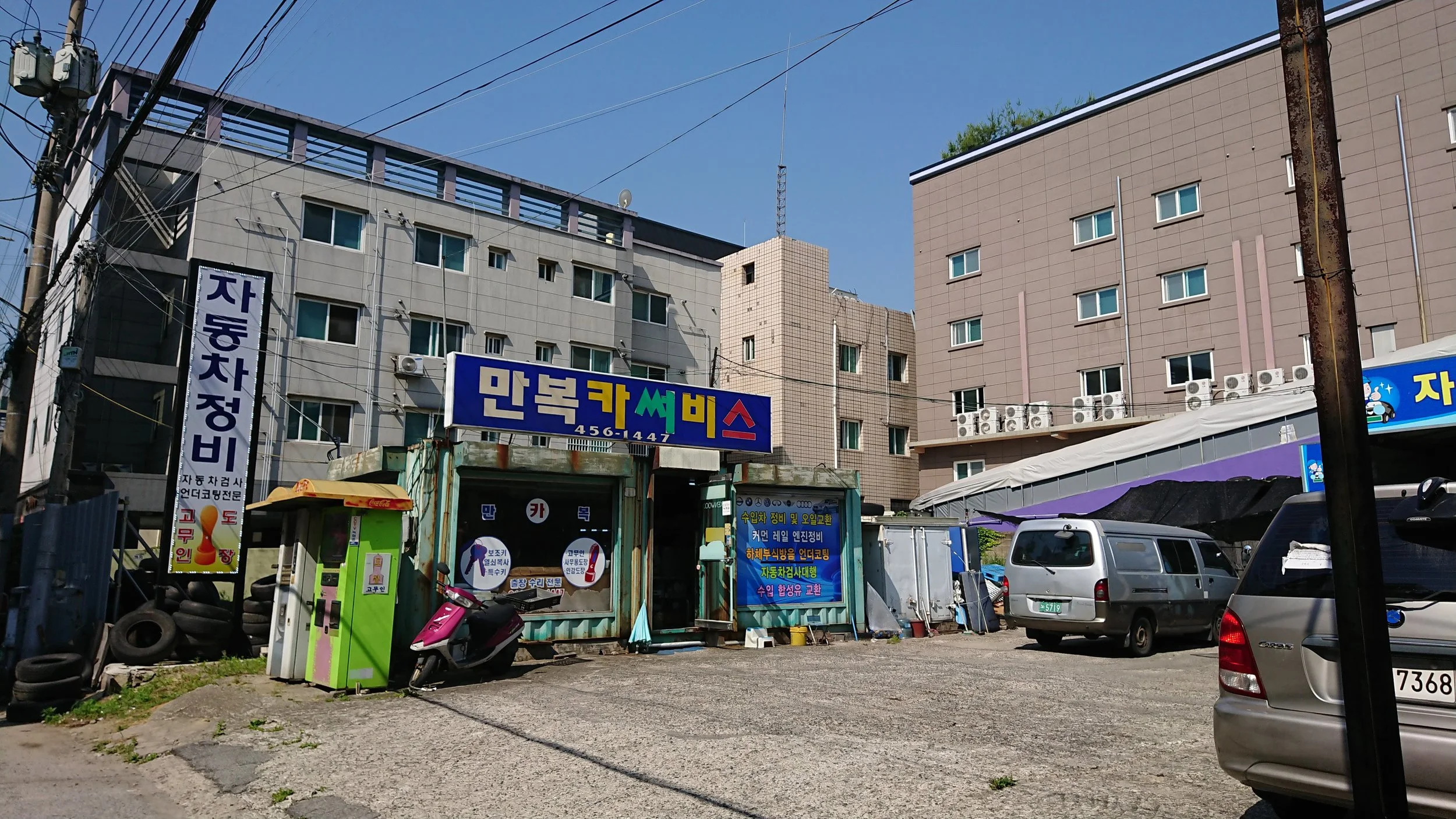While we were technically now in Gumi itself, we still had quite a way to go before hitting the city centre. First, there’s at least 5 kilometres of delightful industrial compounds to ride through before you get to anything resembling a place to stay.
During one of our breaks earlier, we’d done some research on the area and planned to check out the Sun Motel, which got good reviews. But when we actually arrived at the location, we discovered that it had been torn down and replaced with the Line Hotel, which looked spectacularly cheese-tastic. In fact, most motels (and there’s a lot of them in Gumi, you won’t struggle) look terrible and some have dubious-looking bar/clubs attached to them. But we finally came across one that wasn’t as sleazy, despite the name.
Soulmate Hotel, Songwonseo-ro 6-gil, Gumi, South Korea. Neil claims the hotel was meant for us due to the huge Union Jack flag out front.
40,000 won gets us the usual, which our tired selves were very thankful for at this point. While we would have loved nothing more than to go straight to bed, our hungry bodies were screaming for a good feed. So it was with great reluctance that we dragged ourselves back out again into the mercurial haze.
Gumi is not a touristic town in the slightest. It largely exists as an outpost for manufacturing companies such as Samsung Electronics and LG Display, where industries like electronics, textiles, fibers, rubber, plastic and metal are produced. From 2000 to 2009, Gumi accounted for 96.9% of trade surplus in South Korea. It’s also where former President Park Chung-hee was born, a controversial figure in modern South Korean political discourse and among the South Korean populace in general for his dictatorship and undemocratic ways.
There’s a row of restaurants next to the main highway, and as we were perusing our options, we witnessed something that Jess can only describe as an endemic societal issue. One of the fancier establishments had valet parking, and there was an older man in a Mercedes-Benz* who was having difficulty manoeuvring his car in the tight space. The valet tried to be helpful and guide him into his spot, but he was getting increasingly frustrated, and when the valet came over to offer to finish the job himself, the old man yelled at him to get out of the way.
Now, if he had done that to you or myself, we would have probably responded with a curt “Fine, deal with it yourself.” But to our amazement, the valet actually apologised to him, bowed his head in shame, and resumed his previous position.
It’s glimpses like these that remind us just how stringent the Confucian principle of filial piety still is in South Korea, and it made Jess hot with anger. Growing up as an American in a Korean household, she experienced the clash of both cultures and it was a struggle to reconcile the two opposing forces. In that moment, it was made apparent to her that even though she looked the same as everyone here, she certainly felt like a complete stranger, as the valet’s response was just not something she could relate to.
Tired and ravenous, we were in dire need of dinner, and boy did we find the place to sort us out. We enjoyed an immense BBQ dinner at Bornga for only 37,000 won. If, for whatever reason you find yourself in Gumi, (and we can’t imagine what besides the Four Rivers Trail might bring you here, because there’s bugger all to recommend it), we highly recommend eating there. Service was speedy and the food was plentiful, fresh and absolutely delicious.
We were too knackered for much else, so after that, we went back to the hotel to indulge in late night Korean talk shows and rest for the next day’s ride. A real come and go town, this.
*The Korean car market is absolutely dominated by domestic models, so driving an expensive foreign import is a very conspicuous statement of wealth.










